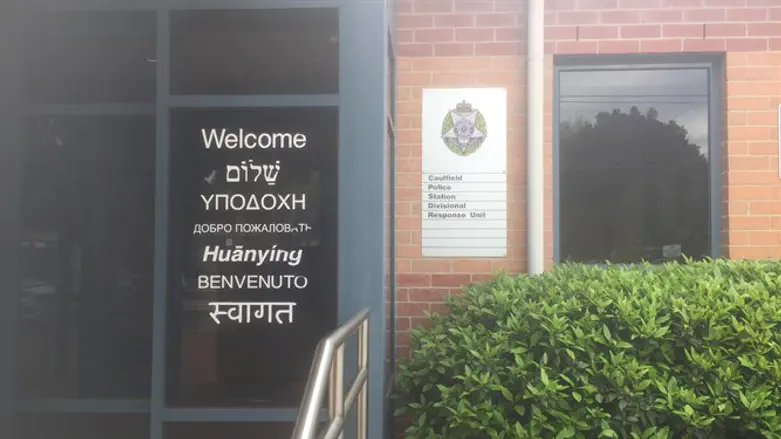
After the Halle Synagogue shooting during Yom Kippur, there were the usual outpourings of condemnation, pavement flowers for the victims, feel-good statements of support and promises of “more security.”
The synagogue shooting followed days after a knife wielding Syrian tried to enter Berlin’s Neue Synagogue. Elsewhere a brick was thrown at the head of a Hebrew speaking woman. Two rabbis had also been recently assaulted.
Germany has again been embarrassed, with little wiggle room to blame such assaults on the Israel-Palestinian conflict. This time the alleged perpetrator expressed neo-Nazi anti-Semitic views. Not shouting Allahu Achbar, he missed out on being dismissed with “psychological problems.”
Unfortunately, “more security” is not a policy but a band aid type measure. Paradoxically it reinforces the perception that Jews are peripheral to German society which is not what Jewish Germans want, and which I have written about previously: https://www.israelhayom.com/opinions/can-german-jews-be-part-of-the-heimat/
If German politicians ordered all places of worship to have visible security, it would be of some comfort to be part of one size fits all. Churches would probably object, so this proposal is moot. More security for synagogues, while essential, raises questions whether Jews can really be part of mainstream Germany. More security therefore is a double edged sword.
The problem goes further because German authorities have advised Jews not to identify themselves publicly as such, including the wearing Star of David necklaces, affixing mezuzot inside doorposts etc.
Jewish communities were recorded living along the Rhine nearly 2000 years ago in relative harmony. As pagan Germanic tribes gradually adopted Christianity from the 5th to the 8th century, anti-Jewish conspiracy theories which encouraged violence and massacres ensued, especially in the 11th century. These theories which included accusations of well poisoning and causing the Black Death became so entrenched in the folklore and national narrative, that it even transcended the ideals of the Enlightenment that swept across Europe. Rational thought and scientific progress which were central to the Enlightenment, did not change the deeply embedded anti-Semitic attitudes. The fact that Jews in Germany were exemplary citizens, later winning some 20% of Germany’s Nobel prizes, though less than 0,75% of its population, indicates that anti-Semitism was very deeply entrenched in the culture.
Initially, post- Holocaust Germany somewhat muted its overt anti-Semitism but over the last two decades, it has become emboldened with former taboos swept aside.
Germany’s guilt about the Holocaust has been expressed in various ways such as building (often white elephant) synagogues but it also included projecting this guilt onto Israel that has become today’s Germany’s Jew.

It is puzzling that despite a miniscule Jewish population of about 100,000 in a country of 82 million, German government figures indicate that 40% of Germans espouse anti-Semitic attitudes. According to the government, these figures have been rising.  It is therefore puzzling that despite a miniscule Jewish population of about 100,000 in a country of 82 million, German government figures indicate that 40% of Germans espouse anti-Semitic attitudes. According to the government, these figures have been rising.
It is therefore puzzling that despite a miniscule Jewish population of about 100,000 in a country of 82 million, German government figures indicate that 40% of Germans espouse anti-Semitic attitudes. According to the government, these figures have been rising.
Management of anti-Semitism has never been effective. Measures such as more security and banning Nazi salutes do not change attitudes which is the crux of the problem. New creative ways to ensure eradication need to be considered. More security needs to be the point of departure, not the destination.
What is needed are bold creative ways to set a new path that will change attitudes.
Some initiatives that could be considered that reflect Germany’s unique position in Jewish history:
1-German schools must introduce compulsory introductory courses explaining Jewish history and culture with special reference of contributions to Germany.
2-Hebrew, a classical language, should join the two other classical languages, Latin and Greek offered at universities.
3-The basics of Jewish festivals should be explained. Some, like Tu Bishvat ( New Year of the Trees,) resonate strongly with the current concern for saving the environment.
4-Churches need to teach children and adults, that replacement theology in any form is not the Christian dogma of the present time. Churches must clarify without ambiguity that such theology has been the basis of pogroms, expulsions, conspiracy theories and discrimination and has no place in today’s Germany.
5-School children need to learn that Jesus was a practising Jew and the popular curse word “Jew” actually profanes Jesus, which is unchristian.
6-The history and development of Israel need to be taught with special reference to its legal, historical and moral foundations.
7-Community involvement including public participation at festivals such as Sukkot and Hannukah should be encouraged. Just days ago in Melbourne, I saw a police station with a big sign on the pavement: “L’Shanah Tova 5780 and well over the fast.” Walking past two policewomen, they smiled and wished me a Happy New Year. Why not in Germany?

A bold initiative that goes beyond “more security” is urgently required if Germany wishes to seriously take the lead in reversing anti-Semitism in Europe. Jews also need to be cautious about not defining themselves in terms of anti-Semitism.
This would involve community and religious leaders, educators, anthropologists, sociologists, social psychologists and others to formulate a workable roadmap that would finally reverse the ongoing trends. Instead of grim faced German political leaders time and again expressing shame at the latest anti-Semitic assaults, let them express delight with Jews at a Sabbath dinner, dipping apple in honey or enjoying a meal in a Sukkah.
Thinking outside the box is now urgently required to stem the tide.
Would such initiatives take time? Yes. Are they doable? Yes. Is there a political will to eradicate (not manage) anti-Semitism? Mmm…
Ron Jontof-Hutter is the author of the satirical novel :”The trombone man: tales of a misogynist .“He is also creator/artistic director of the “ Kristallnacht Cantata: A Voice of Courage.”